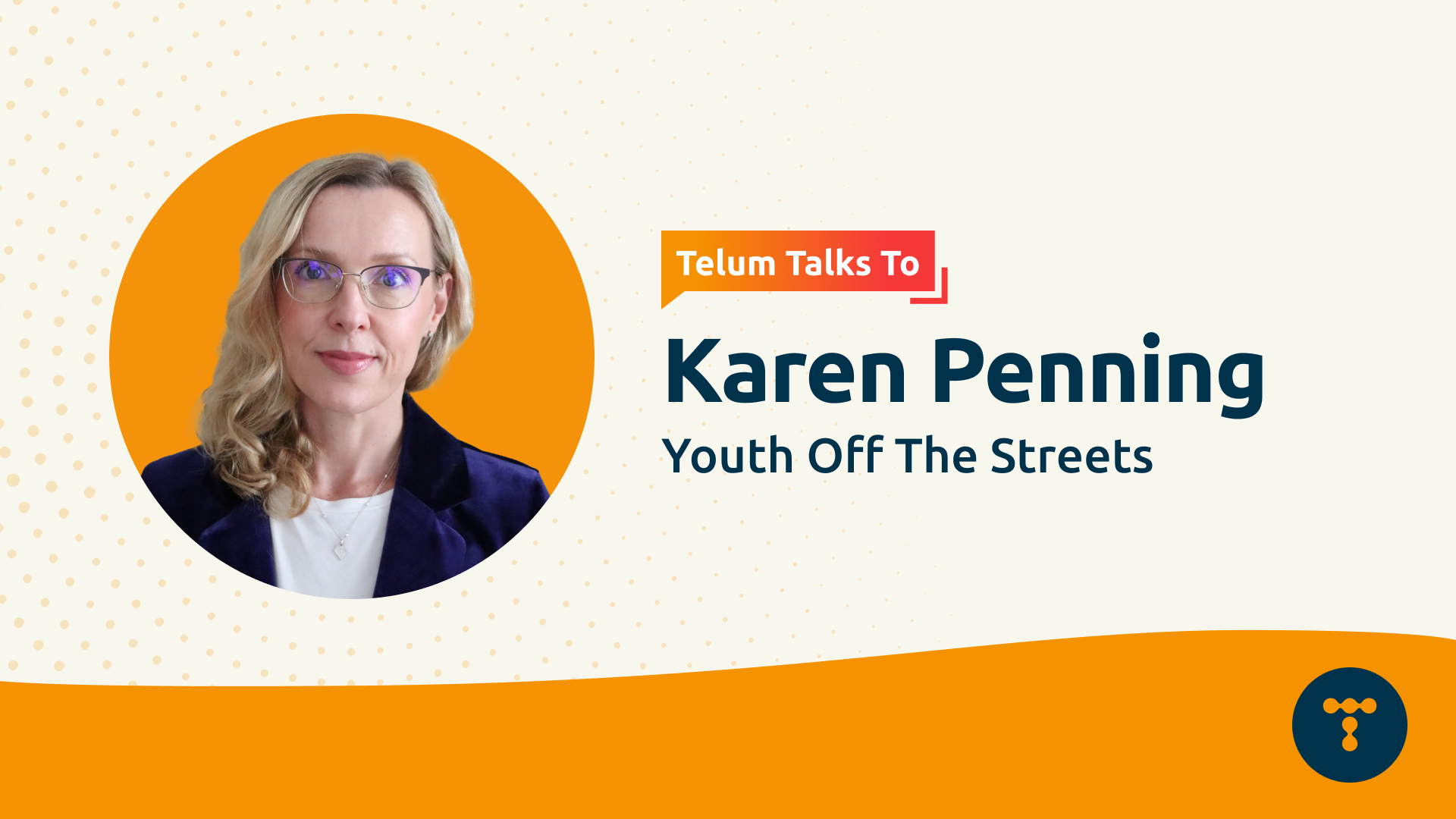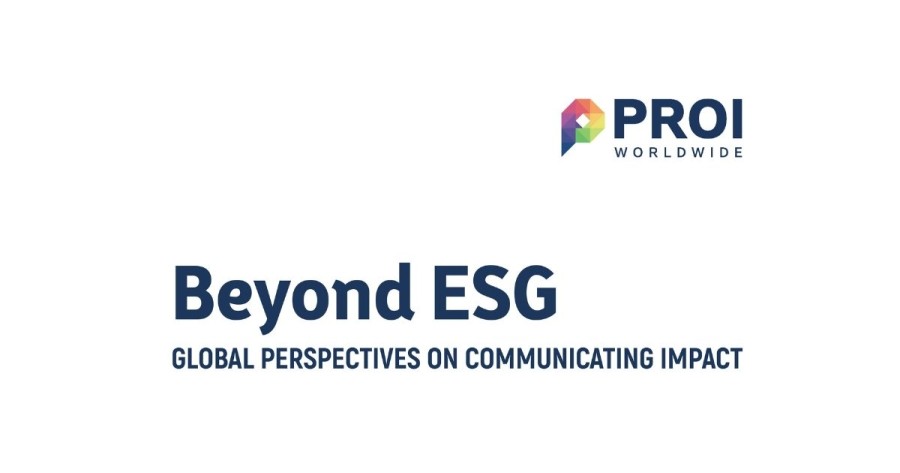The not-for-profit landscape is shifting, with organisations rethinking how they connect with their communities. For Youth Off The Streets, a charity dedicated to supporting vulnerable young Australians, this meant refreshing its brand for the first time in over a decade.
Telum spoke with the charity's Head of Communications and Public Affairs, Karen Penning, to unpack the vision behind the transformation, the challenges of balancing legacy with change, and how they're ensuring the new identity resonates with young people, donors, and the wider community.
After a decade, the charity is undergoing a rebrand. Could you share the vision / purpose behind this transformation, and what communications strategies are being employed to ensure its success?
It has been over 10 years since Youth Off The Streets last reviewed its brand. A lot has changed in that time - not only in our organisation but in the Australian not-for-profit sector and society as a whole. During the process of developing our Strategic Plan 2024-2028, it became clear that to achieve our big strategic goals, we needed to ensure our brand reflected who we are today and that it is relevant, meaningful and inspiring to our external audiences.
Throughout the six-month brand strategy project with Today Design, we consulted extensively with staff, volunteers and young people, as well as sector partners, donors and other funders.
Since the conclusion of the project, I’ve focussed on change communications plans for our internal and external stakeholders. In both cases, we used a range of tactics to explain the rationale for the rebrand and share the outcomes with a heavy focus on conversations - whether in the form of group presentations, team meetings or personal phone calls to supporters of our work. The feedback so far has been very encouraging and enthusiastic.
What challenges have you faced in aligning the new brand with the existing perception of Youth Off The Streets among stakeholders?
We were founded over 30 years ago by Father Chris Riley AM, a passionate advocate for the rights of our most vulnerable children and young people. Through his vision and dedication, Youth Off The Streets has grown from a founder-led organisation into a highly skilled team of experts who provide wraparound services to children and young people in NSW and Queensland.
Our challenge in this brand revitalisation was to honour our grassroots history and Father Riley’s legacy while establishing our identity as a contemporary, collaborative and holistic youth services organisation.
I believe we’ve achieved that with our rebrand, starting with our brand essence - that we exist to support young people to realise their potential, which was at the heart of Father Riley’s ethos - right through to our logo, colour palette, graphic devices and organisation statements.
Rebranding often brings significant changes. How does Youth Off The Streets plan to ensure the community continues to relate to the charity despite changes like a new logo or visual identity?
As we were so consultative and collaborative throughout the research and development of every aspect of the refreshed brand, I'm confident the end result will resonate with our audiences.
As we have been saying, 'new look, same vision' and that really is true. Children and young people in need remain at the centre of every decision we make, and the positive difference we can make on their lives with the support of our generous donors and partners is what really matters. That will never change.
What methods have you found most effective in reaching youth who may not actively seek support? Are there specific platforms or comms partnerships that have worked well?
Children and young people are typically referred to Youth Off The Streets by other community services or their mainstream high school, but I believe we’ll have increased appeal to them and create an even greater sense of belonging through our more dynamic branding.
Another focus for us is attracting new donors, partners and community advocates for our work and the issues facing vulnerable young Australians.
For example, according to the latest Census, children and young people aged 12 to 24 now account for a staggering 23 per cent of Australia's total homeless population. That is completely unacceptable. There is a lot of work to be done and through our rebrand, we aim to inspire and encourage as many people as possible to join us in tackling some very challenging, but not unsolvable, social issues.
Are you noticing any significant trends or changes in how NFP organisations are positioning themselves in the current landscape?
We emphasise in our communications and positioning that we walk alongside children and young people, we don’t sit opposite them and tell them what they need to do.
As a youth services organisation, we’re interested in each individual young person’s circumstances, needs, immediate goals and longer-term aspirations - and in every case, these will be unique to them.
This is where the importance of lived experience and co-designed social services and programs comes into play, an approach which is increasingly being centred across the not-for-profit sector.

Feature
Telum Talks To: Karen Penning, Head of Communications and Public Affairs of Youth Off The Streets
by Telum Media
13 April 2025 4:00 PM
5 mins read
Telum Media creating connections
Get in touch to learn more
You might also enjoy
Research
PROI has released their latest report, "Beyond ESG: Global perspectives on communicating impact". With insights from 11 global communications agencies, the report highlights key trends shaping how ESG and purpose will be communicated in 2026.
Ted Deutsch, Executive Managing Director of RF|Binder and Chair of PROI's ESG Working Group, said: "While certain markets are shying away from acronyms and terms that are seen as overly political, this PROI report confirms that companies are still focused on driving change through sustainability, corporate culture and good governance. The challenge now lies in communicating this with authenticity."
ESG across the regions
ESG maturity differs widely by region. Markets such as Australia, Switzerland, and the Middle East operate in relatively advanced regulatory environments. In Australia especially, Paula Cowan, Managing Director at ImpactInstitute, described ESG as no longer a "nice to have," but rather a licence to operate.
Meanwhile, countries such as Poland and the Czech Republic are experiencing signs of ESG fatigue. As Dirk Aarts, CEO of 24/7 Communication, observed in Poland: "...enthusiasm has cooled. Many businesses now treat ESG chiefly as a regulatory requirement rather than a reputational advantage."
In Thailand, ESG is viewed as central to long-term competitiveness, economic resilience, and access to global markets. Whereas in Ukraine, ESG is shaped by wartime realities and EU integration, with social impact and resilience taking precedence.
Despite their differences, one thing stays consistent: stakeholder expectations are converging. The report highlights how companies are increasingly expected to demonstrate real progress and credible outcomes rather than just showing intent.
Global pressures driving change
It was reported that every region, in one way or another, was being impacted by global forces reshaping their ESG communications. Regulatory alignment stood out as a major driver, particularly around mandates by the International Sustainability Standards Board (ISSB), the Corporate Sustainability Reporting Directive (CSRD), and other international disclosure frameworks.
Trade-related mechanisms, such as the EU's Carbon Border Adjustment Mechanism, have resulted in a push for ESG adoption in export-oriented economies like Thailand. Chelsea King, Head of PR Operations and Editorial Director Midas PR, explained: "This creates direct financial pressure and has spurred Thailand’s domestic carbon tax and mandatory reporting efforts."
Political dynamics also play a significant role, with the U.S. becoming the focal point of ESG politicisation, influencing corporate behaviour across multiple markets. This has contributed to more cautious language globally. For example, in Canada, "...U.S. discourse has influenced Canadian corporate leaders to reconsider how explicitly they use the 'ESG' label," said Kimberly Cohen, CEO of Brown & Cohen.
At the same time, global enforcement action against greenwashing is increasing in Canada, as well as other markets such as Australia, Switzerland, and the UK, reinforcing a shift toward proof-based communication.
Language and framing
The report outlined a clear global trend: the declining use of the acronyms "ESG" and "DEI" in public-facing communications. While these terms remain common in investor, regulatory, and technical contexts, organisations are shifting toward simpler and less politicised language, such as "sustainability," "responsible business," "resilience," and "impact."
Kimberly noted that in Canada, these acronyms are increasingly being broken down into their component parts, whereas in Poland, Dirk explained that the narrative now focuses on health, quality of life, and local community impact - moving away from war language, such as "fighting climate change," toward tangible well-being. This shift doesn't reflect a divergence from ESG principles, but rather as an effort to improve clarity, reduce political risk, and connect more directly with local audiences.
Across several regions, including Canada, the UK, the U.S., Thailand, and the Middle East, an increase in social initiatives continues, but under different labels, such as workforce development, inclusion and belonging, human capital management, and community impact.
Communications challenges
Across all regions, communications leaders are reported to have been facing similar challenges, particularly in balancing ambition with credibility. Stakeholders expect companies to act, but are increasingly rejecting vague or exaggerated claims. Greenwashing, social-washing, and "greenhushing" - deliberately under-communicating progress, which is reported to be rising in Australia - are recurring risks.
Another challenge is internal alignment. ESG data and narratives often sit across multiple functions at an organisation, and when teams are not aligned, messaging can become inconsistent or fragmented, resulting in a lack of trust. In sensitive contexts, such as in Ukraine or politically polarised markets like the U.S. and UK, audiences are sceptical and quick to point out inauthenticity.
Looking ahead
Contributors generally predict that over the next two to three years, ESG communications are expected to become more integrated with financial reporting and core business strategy. Many regions anticipate stricter disclosure requirements, greater use of assurance, and increased focus on governance as the foundation for environmental and social credibility.
Media scrutiny is also intensifying. Investigative reporting on ESG claims is growing, while routine sustainability announcements receive less attention unless backed by data or clear outcomes. At the same time, there is continued demand for accessible explanations, case studies, and stories that demonstrate how ESG efforts deliver tangible benefits to communities, employees, and economies.
Practical guidance for communications professionals
Based on insights across all 11 markets, some common practical guidance include:
- Lead with evidence: Anchor claims in data, defined methodologies, and disclosures, with assurance.
- Adapt language and be precise: Localise messaging and ensure clear messaging that resonates with target audiences, while avoiding unnecessary jargon.
- Show progress over time: Share interim milestones and regular updates to demonstrate momentum and avoid greenwashing or greenhushing.
- Integrate ESG into the business narrative: Position environmental, social, and governance efforts as part of core strategy and operations, rather than a standalone initiative globally.
Find the full report, including in-depth insights for each region, here.
29 December 2025 6:15 AM
5 mins read
Research
Penta’s latest white paper, "Cyber risk is stakeholder risk", explores the growing reputational impact of cybersecurity incidents across industries and stakeholder groups. The analysis leverages Penta’s media intelligence and stakeholder sentiment modelling, covering more than 4.8 million global mentions from January 2024 to August 2025.
Key trends shaping the cyber risk landscape
The study finds that overall stakeholder trust is eroding, reflected in strongly negative sentiment around customer privacy, data security, and incident response across all stakeholder groups - particularly regulators and investors.
Cyber risk is also emerging as a geopolitical concern. State-linked attacks are increasingly viewed as potential national security issues, exposing organisations operating in sensitive sectors to heightened geopolitical risk.
At the same time, reputation recovery is no longer just about containment. The research suggests that a brand’s ability to rebound from a cybersecurity incident is closely tied to the effectiveness of its response, with fast and visible executive action outperforming opaque or delayed communications.
Cyber risk breakdown by industries
Key trends shaping the cyber risk landscape
The study finds that overall stakeholder trust is eroding, reflected in strongly negative sentiment around customer privacy, data security, and incident response across all stakeholder groups - particularly regulators and investors.
Cyber risk is also emerging as a geopolitical concern. State-linked attacks are increasingly viewed as potential national security issues, exposing organisations operating in sensitive sectors to heightened geopolitical risk.
At the same time, reputation recovery is no longer just about containment. The research suggests that a brand’s ability to rebound from a cybersecurity incident is closely tied to the effectiveness of its response, with fast and visible executive action outperforming opaque or delayed communications.
Cyber risk breakdown by industries
- Retail: The most negative sentiment overall, driven by the direct consumer impact of breaches, sensitive customer data, and operational disruption.
- Technology: The most visible sector in cybersecurity discourse, where recurring attacks and regulatory fallout continue to erode trust in digital infrastructure.
- Telecommunications: Among the hardest-hit sectors, affected by repeated attacks and legacy breaches resurfacing on the dark web, raising national security concerns.
- Financial services: Sustained negative sentiment linked to high-profile breaches, customer data exposure, and significant crypto-related losses.
- Healthcare: Persistent distrust driven by repeated breaches involving patient and billing data, alongside heightened scrutiny of AI-related data risks.
- Automotive: Negative sentiment following ransomware attacks that disrupted dealer operations and raised concerns about digital resilience in increasingly connected vehicles.
Overall, the study notes that industries with the most direct consumer interfaces tend to experience the steepest reputational declines following cybersecurity incidents.
Key takeaways for communications and public affairs leaders
Key takeaways for communications and public affairs leaders
- Cyber risk is board-level risk: It must be managed as a cross-functional priority, not solely as a technical or compliance issue.
- Integrated response drives resilience: Organisations that align IT, legal, communications, and executive leadership with clear escalation protocols and stakeholder-specific strategies are better positioned to protect trust and reputation.
- Proactive oversight is essential: Scenario planning, continuous monitoring, and treating incidents as reputational challenges enable faster, more effective responses.
- Leadership visibility matters: Transparent, decisive, and timely action by executives is the most critical factor in stabilising stakeholder confidence and reinforcing organisational credibility.
29 December 2025 1:47 AM
3 mins read
Moves
Ananta Wisesa has been named Head of Corporate Communications at Sinar Mas Agribusiness and Food. Based in Indonesia, he is responsible for the company’s corporate communications activities, including external communications, reputation management, stakeholder engagement, and integrated communications at national and provincial levels.
Ananta brings over 15 years of communications experience, including previous roles at Citi Indonesia, Amman Mineral Nusa Tenggara, and most recently Gunung Raja Paksi, where he served as Head of Corporate Communications.
23 December 2025 7:02 AM
1 min read


